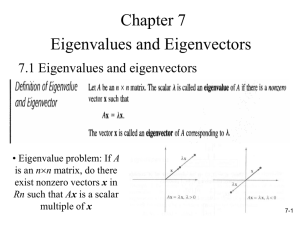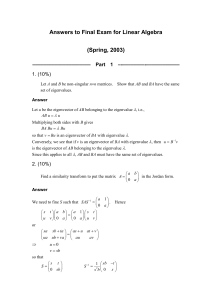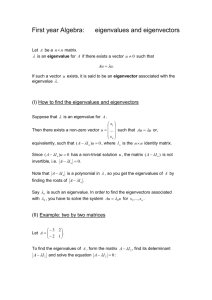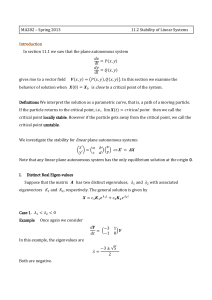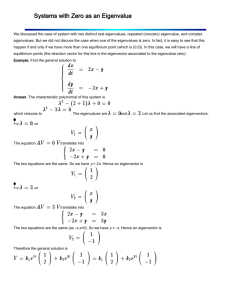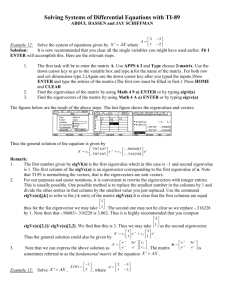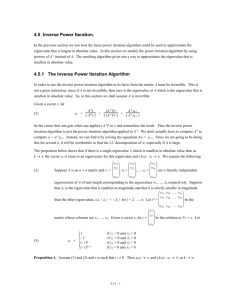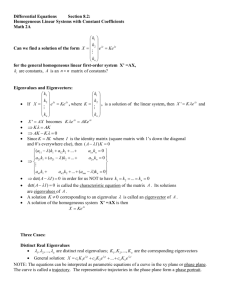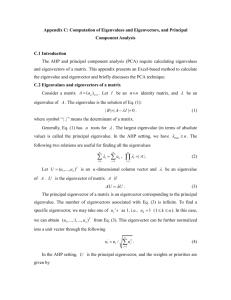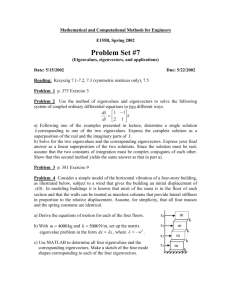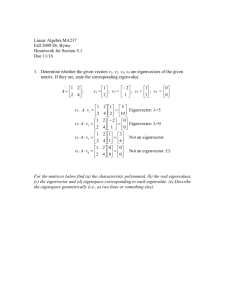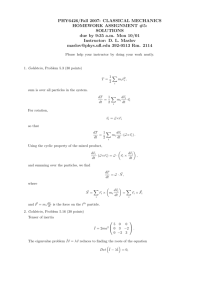eigenvalues and eigenvectors
advertisement
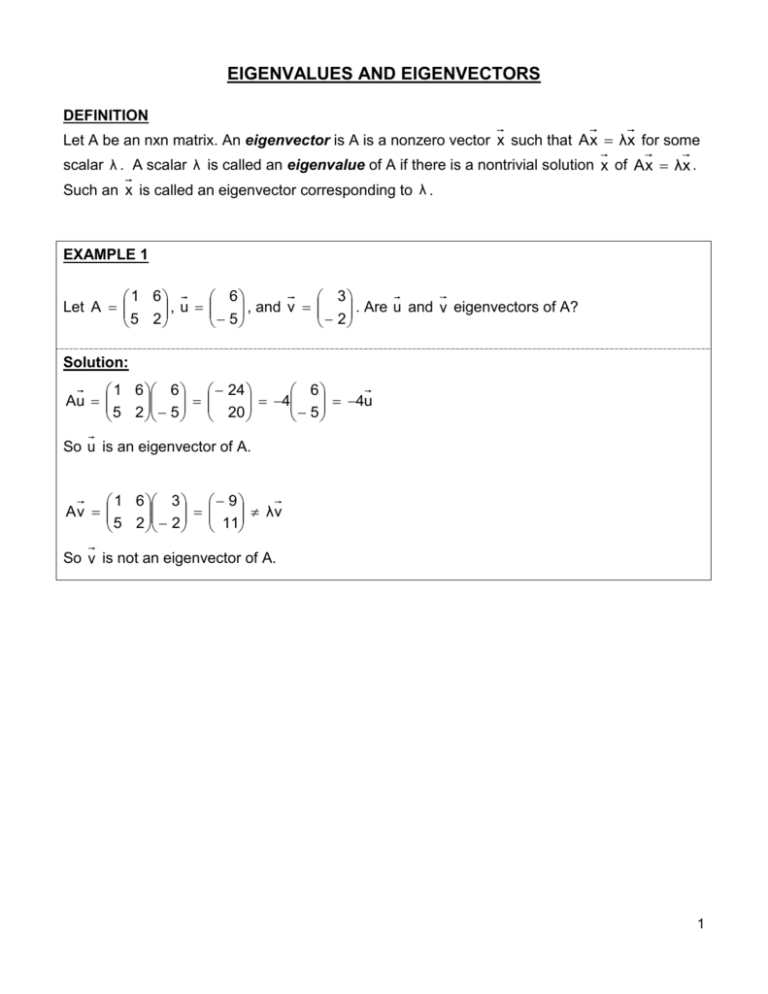
EIGENVALUES AND EIGENVECTORS DEFINITION Let A be an nxn matrix. An eigenvector is A is a nonzero vector x such that A x λx for some scalar λ . A scalar λ is called an eigenvalue of A if there is a nontrivial solution x of A x λx . Such an x is called an eigenvector corresponding to λ . EXAMPLE 1 1 6 6 3 , u , and v . Are u and v eigenvectors of A? Let A 5 2 5 2 Solution: 1 6 6 24 6 4 4u Au 5 2 5 20 5 So u is an eigenvector of A. 1 6 3 9 λv A v 5 2 2 11 So v is not an eigenvector of A. 1 EXAMPLE 2 1 6 . Show that 7 is an eigenvalue of A and find the corresponding eigenvectors. Let A 5 2 Solution: 7 is an eigenvalue of A iff A x 7x for some nonzero vector x . A x 7x is equivalent to A x 7x 0 or A 7I 2 x 0 . This last equation is the one we will work with. 6 1 6 1 0 6 7 A 7I 2 5 2 0 1 5 5 Notice that the columns of this matrix are linearly dependent. So A 7I 2 x 0 will have infinitely many solutions. More specifically, it will have nontrivial solutions so 7 is an eigenvalue of A. 6 6 0 1 1 0 ~ 5 5 0 0 0 0 1 1 The solution set to A 7I 2 x 0 is x x 2 . Each vector of the form x 2 is an 1 1 eigenvector corresponding to the eigenvalue λ 7 . DEFINITION Let A be an nxn matrix. The characteristic equation of A is detA λIn 0 . THEOREM A scalar λ is an eigenvalue of an nxn matrix A if and only if λ is a solution to the characteristic equation of A; detA λIn 0 . 2 EXAMPLE 3 6 1 5 2 3 8 0 0 Let A . Find the eigenvalues of A. 0 0 5 4 0 0 0 1 Solution: detA λI n 5λ 2 6 0 3λ 8 0 0 5λ 0 0 0 1 0 5 λ 3 λ 5 λ 1 λ 0 4 1 λ So the eigenvalues of A are 5, 3, and 1. THEOREM Let A be an nxn matrix. Then A is invertible if and only if the number 0 is not an eigenvalue of A. THEOREM If v 1, v 2 , , v k are eigenvectors that correspond to distinct eigenvalues λ1, λ 2 , , λ k of an nxn matrix A, then the set v, 1 v 2 , , v k is linearly independent. 3 EXERCISES For problems 1- 4, determine if λ is an eigenvalue of A. 1.) 3 2 λ 2 and A 3 8 2.) 3 7 λ 2 and A 3 1 3.) 3 0 1 1 λ 4 and A 2 3 3 4 5 4.) 2 2 1 λ 3 and A 3 2 1 0 1 1 For problems 5 - 8, determine if u is an eigenvector of A. 5.) 1 3 1 u and A 4 3 8 6.) 1 2 2 1 and A u 1 4 1 7.) 7 9 4 3 u 3 and A 4 5 1 2 1 4 4 8.) u 1 3 6 7 2 and A 3 3 7 5 6 5 1 Find the characteristic polynomial and eigenvalues of the matrices in problems 9 - 14. 9.) 2 7 A 7 2 3 2 10.) A 1 1 2 1 11.) A 1 4 5 3 12.) A 4 4 0 0 0 13.) A 0 2 5 0 0 1 0 2 4 7 0 3 4 6 15.) A 0 0 3 8 0 0 0 1 0 0 5 8 4 0 16.) A 0 7 1 1 5 2 17.) A 3 0 5 1 3 8 0 7 4 1 0 0 0 1 0 0 0 2 9 0 0 0 1 2 0 0 0 0 3 0 4 0 0 14.) A 0 0 1 0 3 4 1 2 3 18.) For A 1 2 3 , find one eigenvalue with no calculation. Justify your answer. 1 2 3 5 5 5 19.) Without calculation, find one eigenvalue and two linearly independent eigenvectors of A 5 5 5 . 5 5 5 Justify your answer. 20.) Use a property of determinants to show that A and AT have the same characteristic polynomial. 21.) Let A be an nxn matrix. Mark each statement True or False. Justify each answer. a.) If A x λ x for some vector x , then λ is an eigenvalue of A. b.) A matrix A is not invertible if and only if 0 is an eigenvalue. c.) A number c is an eigenvalue of A if and only if the equation A cI n x 0 has a nontrivial solution. d.) To find the eigenvalues of A, you must first reduce A to echelon form. e.) If A x λ x for some scalar λ , then x is an eigenvector of A. f.) If v 1 and v 2 are linearly independent eigenvectors, then they correspond to distinct eigenvalues. g.) The eigenvalues of a matrix are on its main diagonal. 22.) Explain why a 2x2 matrix can have at most two distinct eigenvalues. 23.) Construct an example of a 2x2 matrix with only one distinct eigenvalue. 24.) Let λ be an eigenvalue of an invertible matrix A. Show that λ1 is an eigenvalue of A 1 . [Hint: Suppose a nonzero vector x satisfies the equation A x λ x .] 25.) Show that if A 2 is the zero matrix, then the only eigenvalue of A is 0. 26.) Show that A and AT have the same eigenvalues. [Hint: Find out how A λI n and A T λI n are related; then explain why A λI n is invertible if and only if A T λI n is invertible.] 5
